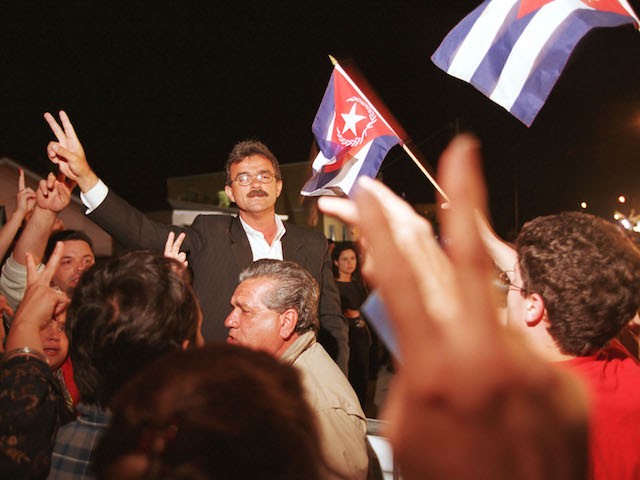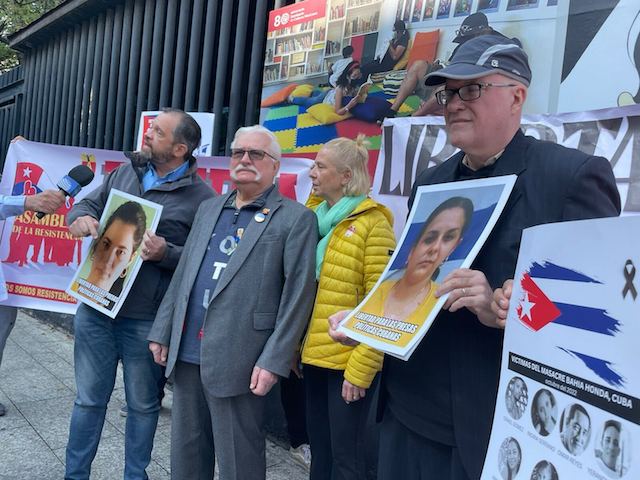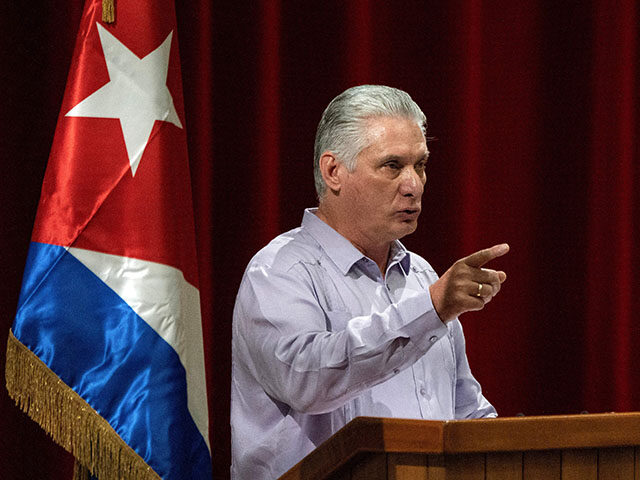The Ministry of the Interior of Cuba published a list of 61 Cuban exiles and 20 organizations headquartered abroad – including journalists, human rights activists, former political prisoners, and internet influencers – on Thursday accused of engaging in, funding, or otherwise supporting terrorism.
The list included explicitly humanitarian organizations such as Brothers to the Rescue and the Movimiento Democracia, dedicated to rescuing Cuban refugees taking to the sea to escape communism. The government also accused well-known Cuban-American organizations such as the Assembly of the Cuban Resistance and the Association of Cuban Ex-Political Prisoners.
The head of the Movimiento Democracia, Ramón Saúl, Sánchez, appeared on the list, as well as journalists such as radio host Ninoska Pérez Castellón, Alain Paparazzi Cubano (who broke the story of Cuban teens scammed into fighting in Ukraine), and commentator Alexander Otaola. Luis Zúñiga, an outspoken victim of torture in Cuba’s political prison, was also indicted.

Ramón Saúl Sánchez holds a prayer vigil in Miami, Florida, on April 5, 2000, for child refugee Elián González. (Joe Raedle/Getty Images)
Orlando Gutiérrez-Boronat, the coordinator of the Assembly of the Cuban Resistance, a longtime human rights advocate and Breitbart News contributor, also appeared on the list.
The Cuban communist regime is a U.S.-designated state sponsor of terrorism and has both supported and engaged in terrorist acts for decades. It is also a close ally of other terror sponsors. Figurehead “president” Miguel Díaz-Canel made the regime’s solidarity clear this week with the world’s foremost state sponsor of terrorism, Iran, visiting Tehran to meet with President Ebrahim Raisi on Monday.

Cuban President Miguel Díaz-Canel, right, is welcomed by his Iranian counterpart Ebrahim Raisi during his official welcoming ceremony at the Saadabad Palace in Tehran, Iran, Monday, Dec. 4, 2023. (AP Photo/Vahid Salemi)
The regime’s victims are among the list of those identified in the indictment, from the survivors of torture in Cuban political prisons to the four Brothers to the Rescue volunteers murdered in February 1996. Carlos Costa, Armando Alejandre, Mario de la Peña, and Pablo Morales – American citizens – were shot out of the sky in international waters while conducting flights to identify and rescue Cuban balseros (rafters) attempting to escape communism. The Cuban communist regime has yet to face any consequences for shooting the plane down. President Barack Obama freed the only person convicted in the affair, a spy named Gerardo Hernández, and prior to that used American government resources to ship Hernández’s sperm across the Straits of Florida to impregnate his wife.
The list was published in the official “gazette” of the Cuban government, which is the way the Communist Party typically announces new laws, foreign policy directives, and high-profile criminal proceedings. The announcement identified those on the blacklist as being “sought by Cuban authorities for being tied to acts of terrorism.” Among the alleged crimes of those listed are “conduct that threatens the constitutional order and normal use or function of media,” “crimes of terrorism whose actions show the purpose of intimidating or forcing the government or an international organization to act,” and “provoking a state of alarm, fear, or terror in the population.”
The organizations were accused of “promotion, planning, organization, financing, support, or commission of material acts in the national territory or other places towards acts of terrorism.” The gazette did not identify any specific evidence against the individuals in question.
None of the 61 individuals identified are on the Office of Foreign Assets Control’s (OFAC) list of specially designated persons, the list of those identified as terrorists, drug traffickers, or otherwise sanctioned by the U.S. government. At least two of the people on the list are dead. The list includes three individuals who were accused of actual acts of terrorism in the 1960s who were processed in the U.S. legal system and are currently of advanced age, three Bay of Pigs veterans, and two alleged CIA affiliates. One person, Alexander Alazo, was indicted in U.S. court in 2020 on charges of shooting at the Cuban embassy in Washington, DC.
A larger number of those on the list do not appear to have any ties to criminal activity. Eight of them are journalists, nine are human rights activists affiliated with anti-communist Cuban-American groups. Two are health workers.
Gutiérrez-Boronat, speaking to Breitbart News on Thursday, described the move by Havana as a sign of worry over the growing political unrest on the island. Cubans have been incessantly protesting in Cuba since the eruption of a nationwide rebellion on July 11, 2021, which made international headlines. Cubans held nearly 4,000 anti-communist protests in 2022. Outside of Cuba, groups like the Assembly of Cuban Resistance have been advocating for free countries to stop investing in or otherwise financially supporting the repression of the Cuban people, most recently in the European Union and Canada.

Former Polish President Lech Walesa, coordinator of the Assembly of the Cuban Resistance Orlando Gutiérrez-Boronat, and other protesters convene outside of the Cuban embassy in Mexico City, Mexico, on November 21, 2022, to protest communism. (Courtesy of the Assembly of the Cuban Resistance)
In a video shared with Breitbart News, Gutiérrez-Boronat described the Castro regime as “extremely concerned by the desire of the majority of Cuban people to be free, to see that regime definitively leave power and they know that every day there is more resistance in Cuba.”
“It is something paradoxical, something hypocritical, for this terrorist regime – which rose to power through terrorism, which remains in power through terrorism – to accuse Cubans who struggle for liberty of being terrorists,” he noted.
Gutíerrez-Boronat also expressed a desire to see the administration of President Joe Biden defend the rights of the people the Castro regime blacklisted, many of whom are American citizens or reside in the United States.
“The Biden administration cannot take for granted the systematic pattern of harassment, intimidation, and even murders carried out by the Cuban dictatorship against U.S. citizens,” he said.
The Castro regime does not have any extradition agreements with the United States and proudly harbors American criminals, so the odds of any of the blacklisted being deported are low. The next steps for the Castro regime remain unclear. There is a possibility that, like other rogue states, Cuba may seek Interpol “red notices,” or requests for arrest, for those identified.
The most prolific international abuser of Interpol “red notices” is Turkey, which has attempted to flood the system with thousands of requests for red notices against political dissidents abroad. Reports in 2017, which Interpol later denied, claimed that Turkey tried to request the notices for 60,000 people at once, causing Interpol to block the Turkish government from the database.
Islamist Turkish President Recep Tayyip Erdogan maintains friendly ties to the Castro regime.

COMMENTS
Please let us know if you're having issues with commenting.